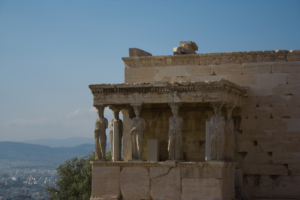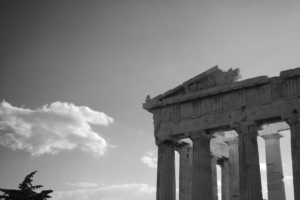Is There More To Greek Mythology?
“Kneeling down Athena breathed her warm sweet breath into each of the little statues. It all happened quite slowly. At first one of the darker figures gave a twitch and let out a kind of gasping moan. Within seconds all the little beings were alive and moving. Just moments later they were trying out their limbs, eyes, and other senses, looking at each other, smelling the air, chattering, and shouting. Before long they were standing and even taking their first wobbling steps.
‘What should we call them?’ Athena asked.
‘That which is below,’ said Zeus after some thought. ‘Anthropos.'”
-Page 119, The Toys of Zeus from Mythos by Stephen Fry.
I have always been deeply enthralled by Greek myths. I find myself wishing I could look back in time. I wish I could see the ancient historical sites, like the Parthenon in Athens, in their prime as I have in their ruins. I can’t help but want to look for what is hidden in the past, in history. I have always been a sucker for a good mystery. All over our world, we can find ties back to the Greeks in architecture, philosophy, and storytelling. Surely, by now we have explored and studied Greek culture more than enough over the centuries, haven’t we?

My earliest memories of myths started with fairies. I was obsessed with them. I loved magic and the idea of a smaller world all around us moving things along. As I grew, I began to see magic in things like storytelling. Though I can’t say when I fell for Greek mythology, I can say it feels like the myths have sat in the back of my mind for years. Unconsciously, the myths have been a part of me.
The first time I truly studied with ease was when I studied Greek mythology. It was like reminding myself of forgotten memories. Nothing else has been as easy to learn. One of my favorite retellings of Greek mythology is Rick Riordan’s Percy Jackson series. After all, I, myself, could relate to those characters when it came to trouble in school. Before I fell in love with learning, I was a horrible student. School and I were not a match made in heaven, but these books showed me I wasn’t alone in that feeling. Like Annabeth, I loved to learn but I hated school.
Myths about the gods are my favorite. I’ve noticed it is only in these tales that we see stories about women. Don’t we all look for ourselves in stories? I know I always look for someone I can relate to, no matter the gender or importance of the character. I have always been attracted to mysteries of the past, like the Seven Wonders—those that disappeared from the world. I’ve always felt there was more to the myths.

Are the myths we know even the real ones? Ancient Greece was extremely male driven—a patriarchy. So I wonder why we mostly see stories centered around women only when they are deities, when they are beings of power, more powerful than humans. Were stories of female heroes lost to time? Some food for thought: maybe there is more to learn from the information we already have. If we stopped applying modern gender norms to ancient people and cultures, what might we find? In myths about goddesses, a woman’s power was known and recognized but hidden at the same time. Why? What if ancient women were freer than we think and “modern” men that discovered this didn’t want “modern” women to recognize their power?
Myths are multilayered. Take the story of Medusa. As men tell the story, it is about a woman who disrespected the goddess Athena by meeting her lover, Poseidon, in Athena’s temple. According to women, Medusa was a beautiful maiden who swore to serve Athena as a priestess. Poseidon, the god of the sea, then raped Medusa in Athena’s temple, before the goddess whom Medusa loved and worshipped. Afterward, the priestess prayed to her goddess for her forgiveness, for protection, for revenge, and Athena heard her prayers. Athena stripped Medusa of her beauty and turned her into a gorgon that turned men into stone with just a look. She answered her priestess’s prayer, but to any man it looked like a punishment. After all, what could be worse than a woman losing her beauty?
The women of ancient Greece took this story to heart; they knew that Athena had given power to someone who was seen as powerless. They used the symbol of Medusa to identify women’s shelters. Medusa became a symbol of protection for the powerless women who looked to each other for aid. Medusa’s story makes me think that all myths have two sides and only male retellings have survived.
It is often forgotten that women had their own culture, their own lives, because the men around them so often controlled them. I think I find myself connected to stories like these—where women take back their power—because I have encountered women who were made powerless through assault, and who have yet regained their power like Medusa and become forces to be reckoned with. I am shocked that we haven’t yet evolved past this. That a myth from ancient Greece still holds true to this day is horrifying. Are we, as a society, regressing somehow? If we’re doomed to repeat history, then I must hope freedom for all is buried somewhere in our past.
Faith Escoe is currently a student at Antioch University aiming for her Masters in Creative Writing. She graduated with her Bachelors in Creative Writing from Full Sail when she was twenty. She enjoys studying mythology and aims to learn two new languages in the next two years. She also spent a semester abroad in Paros, Greece at the Aegean Center. Her love for travel has lead to her focus on learning new languages. She hopes to return to her beloved island in the Aegean Sea after she graduates with her Masters.





